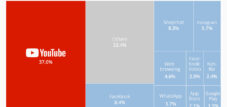How free is the internet? – How Free Is the Internet?
Language selection 📢
Published on: March 13, 2019 / Update from: March 13, 2019 - Author: Konrad Wolfenstein
30 years after his research laid the foundation for the development of the World Wide Web, Tim Berners-Lee is not satisfied with the current state of the Internet. At an event of the Washington Post on the occasion of the 30th anniversary of his foundation, he complained that the Internet was "kidnapped" by crooks by referring to hate speeches, data protection issues and the malicious distribution of false information.
The observations of Berners-Lee are in line with a study by Freedom House , which showed that the degree of freedom on the Internet has deteriorated in recent years. “Disinformation and propaganda spread online have poisoned the public. The unbridled collection of personal data has dissolved the traditional ideas of data protection. And a group of countries moves towards digital authoritarianism by taking over the Chinese model of comprehensive censorship and automated surveillance systems. As a result of these trends, global internet freedom declined for the eighth time in a row ”.
The following graphic based on the results of Freedom House shows a world map of Internet freedom that categorizes the countries in relation to obstacles for internet access, restrictions on online content and violations of user rights. According to the report, China was the worst abuse of Internet freedom in 2018 and “promoted digital authoritarianism as a possibility for governments to control their citizens through technology by reverse the concept of the Internet as the engine of human liberation”.
30 years after his research laid the groundwork for the development of the world wide web, Tim Berners-Lee is not happy with the current state of the internet. Speaking at a Washington Post event marking the 30th anniversary of his creation, he complained that the internet has been “hijacked by crooks”, referring to hate speech, privacy issues and the malicious spreading of false information.
Berners-Lee's observations are in line with research conducted by Freedom House , which found that the level of freedom on the internet has been deteriorating in recent years. “Disinformation and propaganda disseminated online have poisoned the public sphere. The unbridled collection of personal data has broken down traditional notions of privacy. And a cohort of countries is moving towards digital authoritarianism by embracing the Chinese model of extensive censorship and automated surveillance systems. As a result of these trends, global internet freedom declined for the eighth consecutive year in 2018”.
The following chart, based on Freedom House's findings, shows a world map of internet freedom, categorizing countries with respect to obstacles to internet access, limits on online content and violations of user rights. According to the report, China was the worst abuser of internet freedom in 2018, promoting “digital authoritarianism as a way for governments to control their citizens through technology, inverting the concept of the internet as an engine of human liberation”.





























